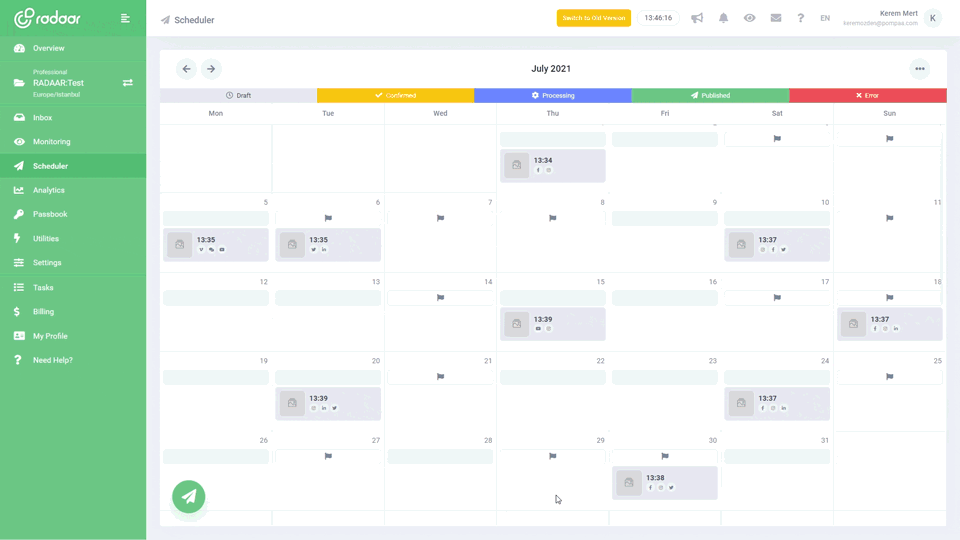How can a small agency achieve big results?
Discover the secret strategies that empower small agencies to punch above their weight and deliver impressive outcomes, from leveraging innovative tools to building exceptional client relationships. Dive into our insightful blog post to learn how to transform limited resources into expansive success.
LEARN MORE LAUNCH DEMO NOW In today's rapidly evolving business landscape, small agencies are proving that size doesn’t have to limit their potential for delivering big results. Despite having fewer resources compared to large corporations, small agencies often bring a unique blend of agility, creativity, and personalized service to the table. By leveraging innovative strategies and fostering strong client relationships, these nimble teams can punch above their weight and achieve remarkable outcomes. In this blog post, we'll explore how small agencies are rewriting the rules of success and the steps they can take to maximize their impact in a competitive market.
Whether you're a budding agency owner or part of a small team aiming to make a significant mark, understanding the key drivers of success is crucial. From embracing technology to building a strong brand identity, small agencies have numerous tools at their disposal. We'll delve into real-world strategies that have worked for others, offering actionable insights that can be tailored to your specific needs. Discover how to harness your strengths, identify opportunities, and cultivate the mindset needed to thrive regardless of your agency's size.
Whether you're a budding agency owner or part of a small team aiming to make a significant mark, understanding the key drivers of success is crucial. From embracing technology to building a strong brand identity, small agencies have numerous tools at their disposal. We'll delve into real-world strategies that have worked for others, offering actionable insights that can be tailored to your specific needs. Discover how to harness your strengths, identify opportunities, and cultivate the mindset needed to thrive regardless of your agency's size.
Table of Contents
- Why does early engagement matter in agencies?
- What strategies do small agencies use successfully?
- How can early client communication boost results?
- Why is flexibility a key for small agencies?
- How can early feedback loops improve agency work?
- What role does innovation play in small agencies?
- Why are small teams often more effective together?
- How do small agencies build strong client relations?
- How can small agencies compete with the big players?
Why does early engagement matter in agencies?
Early engagement in agencies is pivotal, as it sets the foundation for successful collaborations and impactful results. Establishing relationships at the outset ensures that teams fully grasp a client's vision and objectives, leading to more tailored and effective strategies. When small agencies engage with clients early, they have the opportunity to anticipate challenges and address them proactively, fostering trust and alignment. Ultimately, this proactive approach enables small agencies to deliver potent results that resonate with their clients' needs and aspirations.
What strategies do small agencies use successfully?
Small agencies often achieve big results by leveraging their size to their advantage. One of the most successful strategies they use is fostering close, personalized relationships with clients. This enables them to tailor their services to meet specific needs, leading to higher client satisfaction and retention. Additionally, small agencies are often more agile and flexible, allowing them to quickly adapt to changing market trends and customer expectations. They also employ niche marketing strategies, focusing their efforts on specialized markets where they can showcase their expertise and stand out from larger competitors.
Another strategy involves maximizing the use of technology and digital tools to streamline processes and create more impactful campaigns. By staying updated with the latest tech trends, small agencies can automate routine tasks and dedicate more effort towards creative and strategic endeavors. Collaborating with freelancers and forming strategic partnerships allows them to expand their services without significantly increasing overhead costs. Through thoughtful resource management and a keen focus on delivering quality over quantity, these agencies are able to effectively punch above their weight, leading to impressive results despite their limited size.
Another strategy involves maximizing the use of technology and digital tools to streamline processes and create more impactful campaigns. By staying updated with the latest tech trends, small agencies can automate routine tasks and dedicate more effort towards creative and strategic endeavors. Collaborating with freelancers and forming strategic partnerships allows them to expand their services without significantly increasing overhead costs. Through thoughtful resource management and a keen focus on delivering quality over quantity, these agencies are able to effectively punch above their weight, leading to impressive results despite their limited size.
How can early client communication boost results?
Early client communication is the backbone of achieving exceptional results for small agencies, acting as a compass that aligns mutual expectations and goals from the start. By fostering transparent dialogue, both parties can clarify objectives, address potential challenges, and tailor strategies that resonate with the client's unique needs and vision. This proactive approach not only builds trust and confidence but also allows for nimbler adjustments along the way, optimizing the effectiveness of the campaign. Ultimately, consistent and early communication ensures that the agency is in sync with the client, empowering them to deliver impactful outcomes that exceed expectations.
Why is flexibility a key for small agencies?
Flexibility is a cornerstone for small agencies looking to achieve significant results, allowing them to adapt and respond swiftly in the ever-changing landscape of client needs and industry trends. Unlike larger agencies that may face bureaucratic hurdles or rigid structures, small agencies can pivot strategies quickly and efficiently, often providing more personalized and innovative solutions tailored to each client. This agile approach enables small agencies to capitalize on emerging opportunities, outmaneuver competitors, and deliver results that exceed client expectations. In a world where consumer preferences and market conditions can shift overnight, this nimbleness can be a critical advantage.
Moreover, flexibility in a small agency isn't just about adapting to external changes; it also involves fostering an internal culture that embraces creativity, experimentation, and continuous improvement. Team members in small agencies often wear multiple hats, adding a layer of dynamism and versatility to their work ethos, which can lead to fresh, unique campaigns. This collaborative environment encourages everyone to contribute ideas, broadening the scope of potential strategies and approaches. By nurturing a flexible mindset, small agencies can seamlessly integrate new technologies, pivot services, and refine processes to ensure they are consistently delivering optimal results for their clients.
Moreover, flexibility in a small agency isn't just about adapting to external changes; it also involves fostering an internal culture that embraces creativity, experimentation, and continuous improvement. Team members in small agencies often wear multiple hats, adding a layer of dynamism and versatility to their work ethos, which can lead to fresh, unique campaigns. This collaborative environment encourages everyone to contribute ideas, broadening the scope of potential strategies and approaches. By nurturing a flexible mindset, small agencies can seamlessly integrate new technologies, pivot services, and refine processes to ensure they are consistently delivering optimal results for their clients.
How can early feedback loops improve agency work?
Early feedback loops can significantly enhance agency work by creating an agile and responsive workflow that allows teams to quickly adapt and improve. By collecting immediate feedback from clients or internal stakeholders, agencies can address potential issues before they become major hurdles, ultimately saving time and resources. This proactive approach fosters stronger relationships with clients, who appreciate being heard and having their opinions valued, subsequently leading to greater client satisfaction and loyalty. Moreover, these continuous loops of communication and iteration encourage a culture of innovation within the agency, helping small teams achieve outsized results in their campaigns and projects.
What role does innovation play in small agencies?
Innovation is the secret ingredient that allows small agencies to punch above their weight in a competitive market. By embracing creative problem-solving and cutting-edge technologies, these agile teams can deliver uniquely tailored solutions that larger agencies might overlook. Innovation fosters a culture of adaptability, enabling small agencies to quickly respond to client needs and market changes with fresh perspectives and novel approaches. This not only helps differentiate their services but also builds substantial trust and a reputation for excellence among clients looking for bespoke solutions.
Why are small teams often more effective together?
Small teams are often more effective together because they foster closer collaboration and quicker decision-making. With fewer people involved, communication becomes more direct and meaningful, reducing the chance of misunderstandings or delays. Each team member has a clearer understanding of their role and impact, boosting motivation and accountability. Additionally, small teams can be more agile and adaptable, allowing them to pivot strategies swiftly in response to new challenges or opportunities, which is essential for achieving big results.
How do small agencies build strong client relations?
Small agencies often excel at building strong client relationships by providing personalized, attentive service that larger firms might struggle to offer. With fewer clients to manage, small agencies can devote more time and resources to understanding the unique needs and goals of each client, fostering a deeper connection. This close-knit approach allows them to tailor strategies that resonate with the client's vision and adapt quickly to any changes, ensuring that clients feel valued and heard. By maintaining open communication channels, small agencies can encourage regular feedback, which not only strengthens the partnership but also improves the quality of service delivered.
Moreover, small agencies often build their reputation through word-of-mouth and client referrals, making relationship-building essential to their growth strategy. They leverage their agility and creativity to demonstrate value beyond conventional metrics, creating a tangible impact that clients can see and appreciate. By cultivating trust and demonstrating genuine investment in their clients' success, these agencies can establish long-lasting partnerships that yield significant results. This client-focused approach not only reinforces their commitment to excellence but also sets them apart in a competitive marketplace, ultimately leading to bigger results for both the client and the agency.
Moreover, small agencies often build their reputation through word-of-mouth and client referrals, making relationship-building essential to their growth strategy. They leverage their agility and creativity to demonstrate value beyond conventional metrics, creating a tangible impact that clients can see and appreciate. By cultivating trust and demonstrating genuine investment in their clients' success, these agencies can establish long-lasting partnerships that yield significant results. This client-focused approach not only reinforces their commitment to excellence but also sets them apart in a competitive marketplace, ultimately leading to bigger results for both the client and the agency.
How can small agencies compete with the big players?
In conclusion, small agencies have a wealth of opportunities to compete with larger counterparts by leveraging their unique strengths. By focusing on niche markets, small agencies can offer specialized services that cater to the specific needs of their clients, often providing a level of expertise and attention that large firms might overlook. Building strong, personal relationships with clients is another key advantage; clients enjoy working with teams that are genuinely invested in their success. Furthermore, small agencies can afford to be more agile, embracing innovative strategies and technological advancements rapidly to stay ahead of the trends, ensuring they deliver exceptional results that meet evolving market demands.
Additionally, collaboration and strategic partnerships can propel small agencies to new heights, enabling them to pool resources, tap into broader expertise, and increase their market presence without compromising on their agility. Leveraging digital tools and social media can also level the playing field, allowing smaller players to reach global audiences and craft compelling brand narratives. Ultimately, embracing a culture of creativity, dynamism, and client-centric focus can empower small agencies to achieve outstanding outcomes, proving that size is not the sole determinant of success in today's competitive landscape. With determination and the right strategies, small agencies can indeed compete with, and often outshine, the larger players in the industry.
Additionally, collaboration and strategic partnerships can propel small agencies to new heights, enabling them to pool resources, tap into broader expertise, and increase their market presence without compromising on their agility. Leveraging digital tools and social media can also level the playing field, allowing smaller players to reach global audiences and craft compelling brand narratives. Ultimately, embracing a culture of creativity, dynamism, and client-centric focus can empower small agencies to achieve outstanding outcomes, proving that size is not the sole determinant of success in today's competitive landscape. With determination and the right strategies, small agencies can indeed compete with, and often outshine, the larger players in the industry.
SOCIAL MEDIA SCHEDULER
Plan and publish...
Plan and publish your content for Facebook, Instagram, Twitter, and LinkedIn from one simple dashboard.
LEARN MORE FREQUENTLY ASKED QUESTIONS
What is social media management platform?
RELATED BLOG POSTS
All the tips & tricks you'll need...
Get the fresh tips and tricks you'll need to ace social media marketing.











